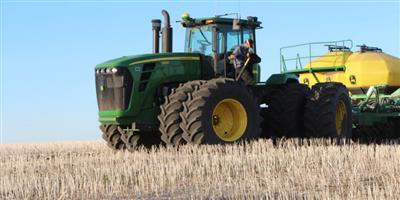By Brad Cook – WIPFLI Agribusiness Practice Leader
In 2021, agricultural producers took a double whammy: pandemic-related relief programs dried up, and about half of the contiguous U.S. experienced moderate to extreme drought. A lack of government relief programs in 2021 (compared to 2020), created uncertainty for growers and food processors.
Government programs, crop insurance and indemnity payments will help companies get through the year – but they’re not life-saving measures, and won’t provide big enough boosts for farmers to invest in technologies or processes that could make them more resilient to future challenges.
Labor is a common concern for the industry; it’s difficult to get enough workers every season. But this year, limitations on international travel intensified the issue, as did uncertainty surrounding immigration policy. A severe shortage of workers also drove wages.
Because of supply chain issues, pricing and availability are in flux for everything from feed to chemical treatments and machinery. Energy prices are also up, and inflation is squeezing margins. Agriculture companies are paying more for everything they need – which will eventually trickle down to the price tags in grocery stores.
So, what can agriculture companies do to stay afloat – or even get ahead?
Obviously, they can’t control the weather. But they can manage aspects of their business to help build resiliency. As we enter 2022, here are eight issues agriculture businesses should pay attention to:
2022 Agriculture Industry Outlook
- Consumer preferences
Some food fads, like organic and gluten-free are likely to stick around for the long haul. Growers and producers who ignore trends – or buyer preferences in general – may be disadvantaged down the road. As shopping behavior shifts locally, farmers and producers need a better sense of what consumers want.
- “Smart” food production
Blood, sweat and tears can’t solve all of today’s food production issues. Every farm and production company will need technology to produce food more efficiently, stay competitive and connect with potential buyers. For some farms, the first step is moving to a cloud-based system to manage financial information. Others can use farm information systems to accumulate data in the field, automate processes and decisions, or meet growing demands for food traceability and origin labeling.
- Adopting a business mindset
New tools can help producers understand their costs better, which leads to better decisions when they’re marketing and selling products. With more insight into the whole production cycle, producers can predict yields more accurately and see how different decisions affect their margins. Information allows growers and producers to look beyond the current growing season and create long-term, strategic plans for the business. If agriculture companies focus more time and money on planning now, they can build more stable and sustainable businesses overall.
- Cybersecurity
Farmers and producers are a big target in the cybersecurity “food chain.” In addition to keeping the world’s food safe from weather, insects and predatory animals, the industry now has to protect against cybercriminals. Agriculture companies have to employ data to overcome labor challenges and produce food more efficiently – but they have to protect their information systems, data and technology, too, which will require new partnerships and skills.
- Barriers to entry
Most farmers are nearing retirement age. Once they hang up their hats, they’ll leave an enormous talent gap in the career field. Land that’s needed to start farming is too expensive for most families or professionals. And it’s a demanding career. Family-run companies in particular need to create long-term and succession plans for the business to ensure continuity. The industry needs more programs and incentives to recruit younger generations. In the meantime, agriculture companies may need to diversify or try different business models to attract younger generations.
- Regulation, policy and advocacy
Agriculture and natural resource companies rely on the environment and bring an important perspective to conversations about climate, water usage, protected species – and other matters that are being decided on, sometimes without their input. Growers and producers need to advocate for the industry and become more involved at the local and national levels. Local farm bureaus and state programs can teach agriculture companies how to get involved, advocate for and influence policy. Staying on the sidelines is a huge potential risk for natural resource professionals. A number of proposed changes could affect agricultural operations and timing related to potential transfers of ownership. Many farmers don’t contemplate retirement as other professionals do, but they should be considering it or at the very least, how they will transfer ownership to the next generation or maximize value for a potential sale.
- Innovation
Farming may be an age-old profession, but that doesn’t mean it’s protected from change. Farmers and producers should pay attention to new farming and sustainability practices that could create alternative sources of income. From hemp to carbon offsets, hydroponics and aeroponics, there’s no telling what will take off. We do know the world’s population is increasing, and we need innovative ways to address food needs. Farmers and producers can influence how the world navigates potential food insecurities and eliminates food waste.
###
Brad Cook is a partner at WIPFLI with vast experience in tax planning, tax compliance, and transition planning for family businesses and is focused on serving clients in the agriculture industry. He also serves as leader of the firm’s agriculture industry practice. As the industry leader, Brad oversees the practice and is responsible for overall financial results, strategic direction, and development of services within the practice, as well as partner and associate development.


